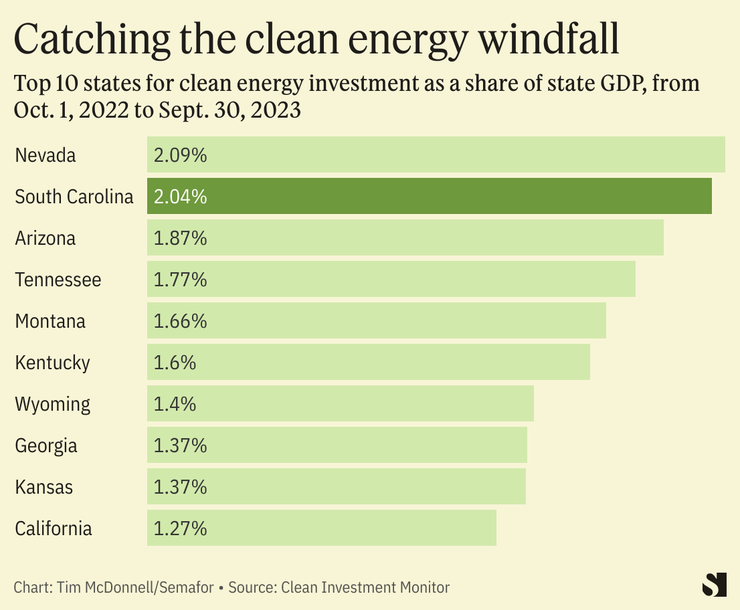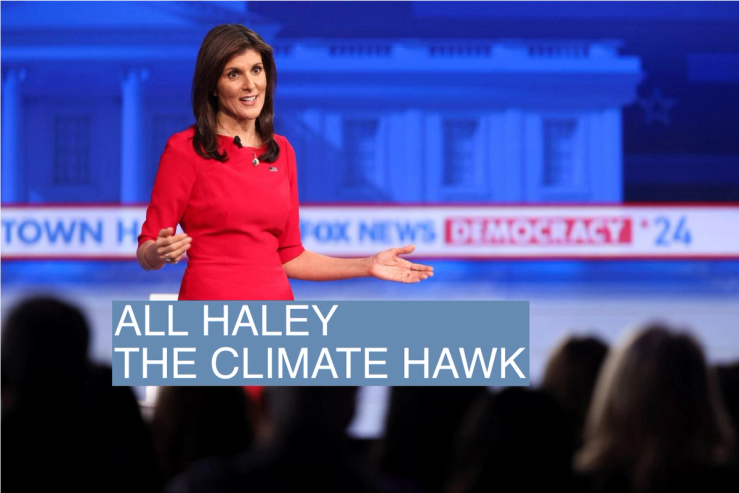The Scene
Republican presidential candidate Nikki Haley won over Ray Gaesser — a prominent Republican farmer in Iowa — with a phone call, and a promise on biofuels.
Haley, the former South Carolina governor who is seen as perhaps the strongest Republican challenger to the frontrunner Donald Trump, set out to court Gaesser’s vote, and zeroed in on his most pressing concern: What to do with all the grain that can’t be sold for human or animal food. He heard what he wanted — that the U.S. should use more biofuels, and that President Haley would mandate their use in blended gasoline as electric vehicles threaten to cut into gas demand.
Gaesser, a former head of the American Soybean Association and ex-agriculture adviser to Trump who is also at the forefront of adopting climate-friendly farming methods, had interacted with Haley a few times over the years. In Iowa politics, supporting Big Ag and biofuels is the price of entry for any candidate. But Gaesser respected Haley’s business acumen, her professionalism — “a lot of us are tired of the finger-pointing and the name-calling” — and her understanding of policy details on the ethanol issues closest to his heart. So he signed on to lead Farmers for Nikki, a group of two dozen or so Iowa farmers supporting her bid in next week’s Iowa caucus.
“There are some other opportunities for renewable energy in the Midwest with wind and solar, but we have a lot of concern here about weakening the renewable fuel standard and not capitalizing on the opportunities from agriculture,” Gaesser said. “You don’t know where some of them stand, but with Nikki I’m very comfortable. She can bring us back to more of a balance.”
The latest polling average from FiveThirtyEight shows Trump at 51% in Iowa, with Florida Gov. Ron DeSantis a distant 17% and Haley at 16%. But Haley will have one more chance to win over more of Gaesser’s peers during a debate with DeSantis tonight.
Tim’s view
Climate policy is not a winning platform for Republican presidential candidates: Just 13% of Republican voters rank it as a top priority, according to Pew, and Trump still maintains that climate change is a “hoax.”
But for those few conservative climate hawks, something about Haley’s message is getting through. She won endorsement today from the Conservative Coalition for Climate Solutions, an advocacy group. And win or lose, that sets her up to shape how the issue is framed for the next generation of Republican politicians. She’s found success in toning down the denial of climate science that’s common in her party, adopting an aggressive posture toward climate-related diplomacy and trade with China, and demonstrating her knowledge of niche energy sectors, starting in Iowa with biofuels.
In a statement, C3 Solutions executive director John Hart said Haley is best-equipped of the Republican candidates to “defend capitalism on the world stage, remove barriers to energy innovation, and embrace an ‘all of the above’ energy policy,” as well as being more effective than Trump in cutting ineffective federal spending.
A growing number of Republican politicians recognize how important climate action is to young voters, including conservatives, and see a long-term benefit in staking out a more pragmatic approach to it, said Bob Inglis, a Republican who represented South Carolina in Congress in the mid-2000s until he was unseated in a primary in large part because of his support for Obama-era climate policies.
For now, Inglis said, most candidates remain terrified of being denounced by Trump. But even if Trump wins the presidency this year, by the time his term is halfway up “the longer-term Republicans will assert themselves,” Inglis said. “People will want to see the new style, and it could be Nikki Haley showing how to do that.”
Know More
In the first Republican primary debate, Haley reiterated that man-made climate change is real, and said the U.S. needs “to start telling China and India that they have to lower their emissions.” As governor, she signed state legislation to support South Carolina’s booming rooftop solar industry, and got firsthand experience responding to climate disasters during a series of catastrophic floods.
But Haley is certainly no climate progressive: As governor, she sued the Obama administration over regulations it proposed to curb emissions from power plants. Later, as U.S. ambassador to the United Nations under Trump, Haley oversaw the withdrawal of the U.S. from the Paris Agreement, the goals of which she said were “not achievable.” More recently, she has lambasted DeSantis for being too “liberal” on environmental conservation as governor of Florida (a position that was broadly popular and successful for him there). She also bashed him for sponsoring legislation while he was in Congress to end the federal Renewable Fuel Standard, which mandates ethanol use. And she has promised that if elected she will cut $500 billion in Inflation Reduction Act subsidies, which she claimed during the first primary debate were “not working.”
In Iowa, she has campaigned in support of carbon capture and storage systems for the ethanol industry, which she said are “good for the environment.” Corn-based biofuels were once a promising possible way to cut emissions from cars, but as electrification has surged forward instead, the water and land required for biofuel production has become harder to justify from a climate perspective. U.S. ethanol producers are keen to lock in higher use gasoline-mixing mandates before gas demand starts to decline, and to branch into new markets like aviation fuel. A spokesperson for the Haley campaign declined to answer questions for this story.
So far in Iowa, Haley has struggled to differentiate herself from DeSantis. The state’s biofuels trade association ranks her and DeSantis equally as the only two candidates taking the group’s favored positions on eight key policy targets, including opposition to electric-vehicle sales mandates. DeSantis has so far visited two ethanol refineries in the state, while Haley has yet to visit one, said Jake Swanson, a political consultant in the state. Tonight’s debate will be another chance to pledge allegiance to Big Biofuels: A November poll of 800 Iowa Republicans by the firm Arc Insights found that 52% believed it extremely important for a presidential candidate to “include American-made ethanol as part of their national energy plan.”
“Candidates who want to win in Iowa have to talk about biofuels and agriculture,” Swanson said. “But Iowans can smell BS. We can tell whether a candidate knows the issue or not.”
Room for Disagreement
Although Inglis was impressed by Haley’s call to action on China, he has been disappointed with her lack of articulation of a better alternative strategy for engaging Beijing, for example by supporting carbon-related tariffs as some Senate Republicans have proposed. Politically, there’s more for a Republican presidential contender to gain from dismissing all climate policy details as part of the “Biden’s agenda” than coming out in support of conservative-friendly alternatives.
The View From South Carolina

Slamming IRA tax credits is also a risky maneuver for Haley, given how much investment they’ve already generated in her home state. As a share of GDP, South Carolina has pulled more clean-energy investment in the last year than any state except Nevada, including major battery factories planned by BMW, Redwood Materials, and others.
“The private sector estimates of the cost of the IRA are the proof that they’re powerful and are going to be deployed a lot,” Inglis said. “The more they get deployed, it’s doubtful many people will want to repeal them.”


